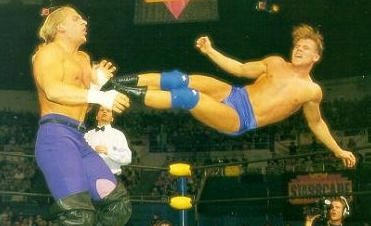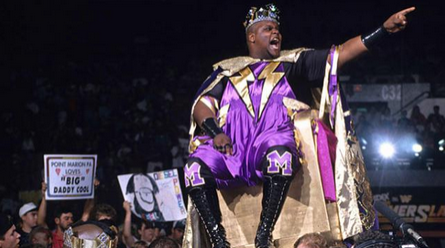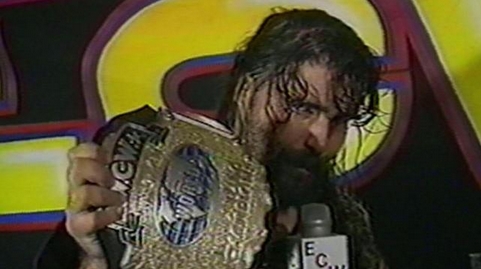Subscribe to the podcast via: iTunes | RSS Feed | Email Newsletter
Wright was identified as one of two major young names coming through in 1994 in WCW. Yes, even in the infancy of Hogan’s dominance at the top, some within the company still had an eye on the future, even if it involved overlooking some of the more tenured but still younger talent in the company like Johnny B Badd, Brian Pillman, Lord Steven Regal and Steve Austin. And you want a funny story about Austin in WCW? Reports in PW Torch suggested that – while WCW didn’t want to push Austin as a major name, they didn’t want to let him go to the WWF incase he became a huge star there. Funny, huh?
Wright’s opposite number, if you like, was a man by the name of Jean-Paul Levesque – you’ll probably know him better as Triple H. WCW saw big things in both and after months of squash match wins paired them off against eachother at Starrcade. It was an intriguing match, with Wright struggling in the babyface role and Levesque thriving after being shorn of his “Terra-Ryzin” name, an albatross around anyone’s neck.
What’s interesting about the match is that Wright was still learning his feet as a babyface wrestler. While he was someone that clearly had the technical basics down he lacked the seasoning that comes with experience to properly communicate his face role. Too, for a German who spoke at best broken English and was in a new culture – it cannot have been easy. Wright, as a result of all this, struggled to really gain empathy in his matches, it took Levesque seemingly calling an audible mid-match to liven up the crowd. While Wright eventually won, Levesque probably scored more points in what was a solid if a little dull affair.
It would be Levesque’s last major act in WCW. They’d been planning to line him up alongside Lord Steven Regal (in the team that would still go on to be called “The Blue Bloods” – but instead with Bobby Eaton alongside Regal). Levesque handed in his notice and was WWF bound feeling, perhaps quite rightly, that WWF offered a better chance of upward mobility than a WCW company that was being taken over by mid-eighties WWF wrestlers. Levesque would go to WWF and be repackaged as “Hunter Hearst Helmsley” a character so similar to the Blue Blood gimmick he was going to get in WCW he reportedly later called Regal to apologise.
But back to Wright – he was now the golden child in WCW. They’d identified someone young (he was barely 20-years-old), tall, good looking, athletic – he had a lot going for him. He had a lot to learn when it came to psychology and being able to have a really good match, but what 20 year old doesn’t? Flair, in particular, had ear-marked him as a star for the future. So Wright’s undefeated streak remained intact as 1994 became 1995.
The methodology with Wright’s development was actually pretty simple. Pair him with guys who were far more experienced, to give him some semblance of in-ring seasoning, as well as keep him unbeaten to theoretically keep the character hot. The character itself was that of a pretty boy, Wright would go to ringside and get mobbed by females (plants). He also came to the ring accompanied by a garish dance track, and he matched that with some equally as horrible dancing.
Was it working? Well, it's quite difficult to say. WCW's taping schedule in front of an audience taught when to cheer and when to boo didn't particularly help. For most this wouldn't be an issue, but because of Wright's lack of experience but it meant when he was faced with an actual, less receptive audience (often starkly so) he was like a rabbit caught in the headlights.
Wright faced Bobby Eaton in the January Clash Of The Champions - a decent if unremarkable match. The same should have been said for his February match with Paul Roma, but it was anything but. The storyline going into the match onscreen was Roma being jealous that all of the women were after Alex and not him, in a great example of art imitating life Roma was indeed jealous of Wright, but not of his ability to attract females, but of his push.
The match at Superbrawl makes for very interesting viewing. Roma very early on goes "off script", blocking any of Wright's offence and "going into business for himself. Wright, unsurprisingly, was due to win the match and he did so, but not before Roma hit legitimately one of the best top rope elbow drops you are every likely to see, and kicked out of the final pinfall before three, but they awarded Wright the match anyway and commentator Tony Schiavone quickly rejected pleas from Bobby Heenan to see a replay. Roma was fired soon after, the company needing little incentive to cut costs given the financial position they were in.
Wright's push continued in earnest, even if he missed the WCW Uncensored PPV in March (it was probably a good thing he did!). He was still undefeated, and found himself in WCW's US Title Tournament match against Ric Flair.
The Flair political situation on the whole was very interesting. Flair was head booker, but lacked the full control that a head booker would have as anything that fell under the jurisdiction of Hulk Hogan was often beyond Flair's control (see the main event of Uncensored). So Wright, not being a Hogan guy, was a guy being pushed in large part because Flair liked him. Now, obviously Flair wasn't going to lose in this situation, but he felt so bad about ending Wright's undefeated streak he actually had the match re-taped with a disqualification ending. Wright's streak lived on.
His next opponent was Arn Anderson for the TV Title at Slamboree. Wright (aided by some good commentary from Bobby Heenan) actually tried to beat Anderson at his own game, focusing on mat work, and for a while it worked as Wright held is own in what would probably have been his best match to date. In the end Wright did lose, but the albatross was off his back.
June bought a match with Brian Pillman, in a (for 1995) rare face vs face match up. The intention was that Pillman would play a subtle heel, but given his links to Cincinnati (where the Great American Bash was being held) the crowd were into him and slightly anti Wright. That being said the pair put on what (for all of about two hours) was the best WCW pay per view match in almost a year. The fast, aerial action was something that we would become used to in the company in the years that followed, but Wright and Pillman put on a spectacle.
It was just another chapter in the already eventful debut year for "Das Wunderkind". He had improved a lot, but was still getting a push way above his station. That Pillman match would probably be the end of any major chances for Wright, as Ric Flair would be shorn of head booking duties shortly after. Wright would remain in WCW, once being rebranded "Berlyn", but this run in 1995 was probably as good as it got.



 RSS Feed
RSS Feed